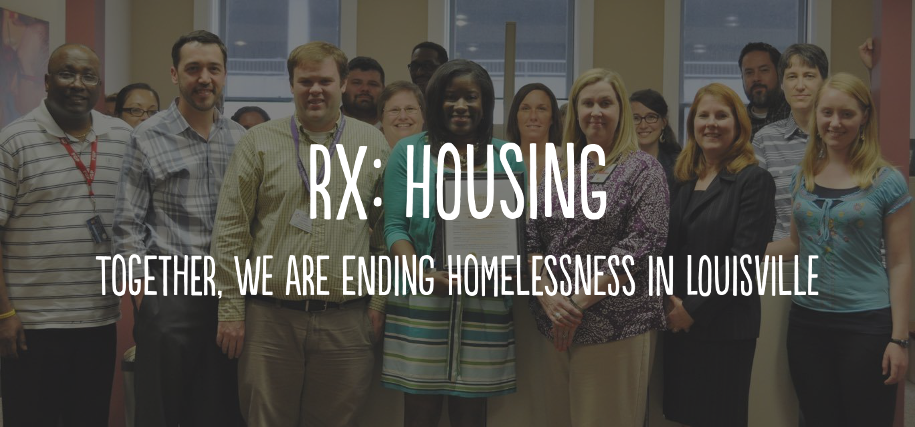
This page summarizes the entire Rx: Housing program, which was launched in 2011. Please click a link to jump to any of the specific Rx: Housing initiatives:
In 2011, a group of Louisville’s homeless services providers joined forces to create a new program. We were motivated by a growing concern: that we needed to get smarter about ending homelessness for the most vulnerable people in our city. Together, we agreed to commit to moving the most vulnerable chronically homeless people—those most likely to die—off the streets and into permanent supportive housing. The name of the program—Rx: Housing—comes from the idea that the prescription (or Rx) to the numerous health problems of the chronically homeless is, simply, to get them housed.
What’s amazing about Rx: Housing is that it not only saves lives, but it also saves hundreds of thousands of dollars in ER visits and incarceration costs. Perhaps most importantly, though, it gives dignity back to people who have lived for a long time without it.

The first Rx: Housing initiative was our local version of a national campaign called 100,000 Homes, which aimed to house 100,000 homeless Americans by 2014. That program, coordinated by an organization called Community Solutions, was very successful. Locally, too, our initiative was tremendously successful, cutting the number of chronically homeless people on the streets by over 50% from 2011-2014.
The key partners for this initiative were:
- The Coalition for the Homeless: the Coalition launched the program, coordinated the survey of the homeless, managed the list of individuals needing housing, and collected the resources;
- The Louisville Metro Housing Authority: LMHA provided Section 8 and Shelter Plus Care vouchers for this initiative;
- Phoenix Health Center (of Family Health Centers): Phoenix was the applicant and was awarded a $1.5 million SAMHSA grant to serve the most vulnerable homeless people; and
- Wellspring, St. John Center, Bridgehaven, and Seven Counties Services’ JADAC Division: The four other services providers who served the most vulnerable homeless people with the SAMHSA grant funding.
We wouldn’t have been able to do this work without the support of a long list of community partners who conducted surveys, donated funding for apartment deposits and furniture, or volunteered in other ways to make this initiative successful. They include Humana, the GE Foundation, Spalding University, The Clifton Center, the Frankfort Avenue Business Association, Yum! Brands, Louisville Downtown Management District, The Dona O’Sullivan Fund, The William Barth Foundation, AT&T, Sisters of Charity, and so many of our loyal individual donors and volunteers.
Rx: Housing Veterans was the second collaborative Rx: Housing initiative with a bold goal of ending veteran homelessness in Louisville by 2016.
In late 2015, Mayor Greg Fischer became one of the first mayors in the country to join the Mayors Challenge to End Veteran Homelessness. That fall, the Coalition for the Homeless gathered together many committed organizations, business partners, governmental partners, and individuals. We documented the resources that each partner brought to the table in order to make a comprehensive plan for ending veteran homelessness. Other key plan components included a system for identifying every single homeless veteran in the city; building a centralized triage system to make it easier for veterans to access the services that they really needed; and strategizing on how to collaboratively eliminate gaps in services and how to reach those who were the hardest to serve.
So many Louisville organizations were already doing such good work to help our veterans; the Coalition’s focus was on bringing together those disparate organizations in order to more effectively and efficiently meet the needs of our veterans who sacrificed so much for all of us.
On Veterans Day 2016, the Mayor received word from the U.S. Interagency Council on Homelessness that Louisville had reached “functional zero” for veteran homelessness, meaning we had housed each identified homeless veteran and had committed enough resources each month for each future homeless veteran to receive housing and services in a timely manner. This was certainly a huge cause for celebration: in total, 838 veterans were housed in 2015 in Louisville.
Unfortunately, about 25 veterans become homeless each month in Louisville—just under one veteran each day. The Coalition’s partners continue to work hard to identify and house these veterans as quickly as possible and will continue to dedicate resources to do so indefinitely.
Participating Rx: Housing Veterans agencies included the Office of the Mayor, the Coalition for the Homeless, Robley Rex VA Hospital Homeless Programs (VA), Volunteers of America (VOA), Louisville Metro Housing Authority (LMHA), Family Health Centers (FHC), Louisville Metro Community Services, St. Vincent de Paul, Interlink Counseling Services, Veterans for Peace, Restoration Center, St. John Center, The Kentucky Department of Veterans Affairs (KDVA), Legal Aid Society, the Brain Injury Alliance, VCAL, Seven Counties Services, and Wellspring.
To view the detailed plan to end veteran homelessness, including an outline of all resources committed, please click here.
We continue to seek business partners and individuals to support this initiative, which is still serving the 25-30 veterans who become homeless each day. We firmly believe that no one who wore our country’s uniform should have to live on the streets or in shelter, and we are committed to working together to ensure that no one will.
To make an investment in the Rx: Housing Veterans initiative, click here.
If you are a landlord interested in renting to homeless veterans, click here to reach out to John Miles with Metro Louisville to learn more.
In 2016, as the Coalition continued to maintain an end for veteran homelessness, we turned our eyes back to another important group: the chronically homeless.
HUD defines “chronic homelessness” as any homeless person with a disability who has been living outside or in emergency shelter either for a) at least a year, or b) at least four times in three years. We know that the chronically homeless are the most vulnerable of all homeless individuals—they are the most likely to die on the streets—and that the cost of being homeless is highest among this group.
Between 2011-2014, our first Rx: Housing initiative had reduced chronic homelessness in Louisville by 50%, but that number creeped up again over time without dedicated resources. Our goal in early 2016, then, was to identify and house new chronically homeless people in Louisville, and to maintain the work we’d started years ago.
In January 2016, the Coalition again gathered a group of nonprofits, governmental organizations, corporations, and individuals to create the Louisville Plan to End Chronic Homelessness, which again included identifying a name-by-name list of chronically homeless individuals.
Thanks to the hard work of our partners, chronic homelessness has been kept at just 50% of its 2011 levels.

In 2017, we launched a new Rx: Housing initiative to end homelessness among unaccompanied young adults.
Alarmingly, the Coalition noticed that, from 2008 to 2009, 2009 to 2010, and again from 2010 to 2011, the number of homeless young adults in Louisville doubled, reaching a peak of 562 in 2013.
In 2015, we counted 418 young adults aged 18-24 living in adult emergency shelter or on the streets, plus an additional 450 youth below the age of 18 served at YMCA Safe Place, our partner agency that exclusively serves youth.
The Coalition and our partners are intervening in the lives of these homeless young adults through housing and life-changing services that lead to self-sufficiency. In September, we founded the Louisville Homeless Youth Committee, whose vision is to create opportunities for all young adults in Louisville to obtain secure housing and flourish through their own contributions to the city. We have pulled together nearly 50 partners in Louisville with this vision in mind. These partners include our member agencies, employment-focused groups, health services organizations, educational institutions, governmental partners, and more.
As with all other Rx: Housing initiatives, the Coalition has put together a comprehensive plan that we are using to reach this bold goal. It includes extensive research, the needs identified through that research, our proposed collaborative solutions, and the resources required to execute those solutions. Click here to read the comprehensive Louisville Plan to End Young Adult Homelessness. We will gauge our success on nine measurable outcome goals, including housing all identified homeless young adults and shortening the length of time young adults are unsheltered to no more than 30 days.
According to research by Clive Belfield, researcher and professor of economics, not addressing the needs of homeless youth leads to higher future costs. The largest costs to taxpayers are those of crime to victims and lost earnings by members of the cohort. Using this research, we estimate that the annual cost for 418 homeless young adults identified in Louisville is $14,892,156. The likelihood of lifetime of government assistance for young adults increases exponentially if their needs are not addressed by the age of 24.
We are again grateful to our partners and supporters. Thanks to this collaborative and data-driven approach, modeled on national best practices, we are confident that we can bring an end to homelessness for young adults.
To support the Rx: Housing Young Adults initiative, or to get involved, please reach out to Natalie Harris.


